- Home
- Dusty Richards
Deuces Wild Page 4
Deuces Wild Read online
Page 4
A black porter, in a uniform, put down a step for them, which they used to climb onto the platform between the cars. Inside the one on the right, Egan pointed to a bench and had him slide in. Then Egan pushed the other back over so they had two seats facing each other. The lawman put their cases in the rack above them. With his small chain and lock, he fastened Deuces’s cuffs to the iron bar on top of the seat’s back.
This forced him to sit sideways with his back to the window. “That should hold you, Buck,” Egan announced, and went to digging for his passes when the frowning conductor came down the aisle.
“He a killer?” the railroad man asked when he stopped before them. The silver clicker in his hand made small pieces of paper fly out of the tickets.
“He’s an Apache,” Egan said.
“Where’re you taking him?”
“Leavenworth.”
“Need all of them savages put up there,” the conductor said, and went on down the car punching tickets with a clicking sound.
While Deuces only had a short look at the other passengers, he could smell them. Strong perfume and female scents were powerful. Powder, too, he could smell it, mixed with the sour sweat of white men and the strong twang of tobacco and hard liquor. He’d better enjoy even the worst smells in his nose, for there would be no females even to sense where they would jail him.
“Don’t get no ideas on running off,” Egan warned.Then he slumped down in the seat, put the felt hat over his eyes, and propped his dusty boots on the other side, so he blocked the way out. Deuces nodded that he heard him.
The clack of the train’s wheels on the rail joints made a song. But he did not sleep. Fear of the future did not keep him awake—his mind was set about what he must do. Somehow he needed to get away from this strange white man. The soft lamps in the car caused a low illumination of the passengers’ faces, enough so he could see them when he twisted his head around to look them over. How could he escape this sleeping Egan? He heard a gagging sound. Someone up the aisle was getting sick, maybe from the swaying of the car from side to side. A young woman rushed by, holding her mouth, and the strong sourness of her vomit filled his nose. Her man followed her, looking helpless, and all heads in the car swiveled to follow their progress.
She ended up outside on the platform, and Deuces could hear her retching more in the space between the two cars. He listened to her choking sounds and how she talked desperately to her man about her illness.With the car door open, he could glimpse them standing on the swaying platform as the train steamed on.
Egan stirred and sat up. He twitched his nose in displeasure. “Someone get sick?”
“Yes.White woman get plenty sick.” Deuces indicated the doorway behind him.
“Damn, you can speak English,” Egan said at his discovery. “Whew. Gawd, it sure stinks bad. Someone needs to get that porter to mop it up.”
In a short while, the black porter came into their car with a mop and bucket and scrubbed down the aisle, especially around where the lady sat. She apologized to him. He laughed it away, talking to her the way the buffalo soldiers did—hard for Deuces to understand him.
He looked out the window at the low brush. He could see in the starlight silhouettes of the yuccas’ dry seed heads on stalks and distant mounds that must be far-off mountains. This was still part of his homeland. He knew this set of iron track would be the route back to his mountains. But this train and its speed concerned him more. Like an eternal galloping horse, the engine never quit, going away, away, away, farther from his land.
Chapter 3
BURT GREEN KNEW LOTS OF PEOPLE IN THE WALLED city: Tucson’s rich, poor, tough ones, and the criminal. Prior to his marriage to Angela, he spent long hours playing poker in the local saloons to supplement his meager earnings as a deputy U.S. marshal. But meeting the lady changed that schedule, although he never missed the throat-cutting smoke that hung like a river fog over the tables and dimmed the candles’ lamp power. Nor the crooked tinhorns he exposed after observing them crudely slip cards up their sleeves and into their pockets. No part about his former life as a gambler held any great emotional calling for him to return.
Some called him lucky at cards, others he knew muttered obscenities behind his back about his skills at poker, but the results never bothered him. His strapping six-feet-tall, broad frame intimidated most challengers, and the long rides after wanted fugitives gave him enough physical prowess to put the stupid ones down quickly.When he glanced over at the handsome woman on the buckboard seat beside him, he felt he’d drawn a much better hand when he married her. At thirty-seven, it was time for him to settle down. The thirty-two-year-old attractive widow made a perfect choice for this new phase in his life.
He drove the team through the narrow Tucson street cluttered with bleating milk goats and the herder-peddlers offering their production straight from the udder. Burros in trains, bristled with firewood, walked docilely to the side of the traffic. Their burdens mostly long-dead mesquite or ironwood branches, great kindling for cooking fires. Other donkeys carried water barrels, dipped fresh that morning from the Santa Cruz River. The peddlers shouted about their wares: “Tamales. Good tamales!” “Fresh milk! Fresh milk!” “Melons, ripe melons!” “Ripe corn, I pick today!”
Their voices loud in Spanish and the braying of a jackass or two added to the street sounds. Underfoot, fighting chickens scratched in the dust. Hens and chicks ran for cover at the approach of his rig. Roosters bragged in loud crows, and women shouted at one another to be heard. Burt considered the din; he had almost forgotten the town’s street sounds that awoke him each morning in the boardinghouse before he married and moved to the ranch. Another reason he felt fortunate—her place north of town was such a pleasant haven for his long-stressed ears.
In the adobe office, Burt found Chief Marshal Denton Downy at his desk. The balding, bearded man looked up as if considering Burt’s presence, then he leaned back in the wheelback chair, fetching a silver pocket watch from his vest. He flipped it open and checked the time, than snapped it shut.
“You here to work?” Downy leaned over and spat in the brass spittoon beside his desk.
“No. Bandits struck at her ranch again last night. I shot one, wounded another. Brought them to town.”
Downy frowned with his salt-and-pepper bushy brows. “Same ones that shot her husband, Frederick Van Dorn?”
“The wounded one denied it.”
“Believe him?”
Burt shrugged—made him no mind. Sooner or later, he would find that culprit and settle with him. “He said that Alfredo Torres is their leader. You ever heard of him?”
“No, but there’s a zillion two-bit bandits down in Sonora.”
“I need to hire some men to guard the ranch before I can go to Mexico to look for that stage robber Taylor.”
“Sure, take all the time you need. I’d bet Taylor ain’t going anywhere down there.”
“Good. Put some feelers out for me about this Torres.”
Downy spat in the spittoon beside his chair again and rose up. “I will. See you when you get the guard business all settled.”
“Thanks.”
Then a knowing grin parted Downy’s bushy beard and mustache. “How’s this married life treating you?”
“Wonderful,” Burt said, not to be taken in by his sly comment.
“You won’t say that in two years.” Downy scowled and went back to his paperwork. “You’ll be a-wishing you were single again. Mark my words.”
Out in front of the building, Burt joined his wife at the buckboard, climbed onto the seat, and clucked to the horses.
“Did he know anything?” she asked.
“He says in two years, you will be tired of me.”
She frowned in dismay at him. “He didn’t?”
“Well, something like that.” Then he grinned big. Be a damn sight longer than that before he grew tired of her. Better go see the man he planned to hire—Pedro Astanchez. If he could find Pedro at home and if he
needed work, the Mexican would be his first choice for a ranch guard.
“This is where he lives?” Angela asked, looking disappointed at the sight of Pedro’s run-down place. A lane from the road between two sagging barbwire fences led toward a jacal that needed to be replastered with two ramadas and a fallen-down corral.
Burt nodded and turned the team up the driveway.
“We can hope he’s at home.” He looked at the two slab-hipped horses standing hipshot in the small irrigated pasture. The whole thing did not ring of industry, but that was by a gringo’s standard.
“Ah, señor!”’ a familiar young woman shouted, rushing out of the jacal. She wiped her hands on her apron.
“Señora,” she said with a bow when Burt reined the horses up.
“Good to see you, Juanita. You know my señora, Angela? Is your husband here?” he asked, tying off the reins.
“Nice to meet you. Pedro is taking a siesta.”
He checked the sun time and agreed with a nod. “We would have been here sooner, but we had some prisoners to give the sheriff.”
“No problem. He will be glad to see you. I will go wake him.”
“Fine,” he said, and glanced about. Then he nodded privately at his apprehensive-looking wife to reassure her things would be all right.
In a short time, Juanita returned with the sleepy-eyed Pedro Astanchez, who carried his straw sombrero in one hand at his side. His handsome features were those of Spanish aristocrats with less Indian blood than most latinos. He came with a spring in his walk, eagerness written in his look when he recognized Burt.
“Marshal Green,” he said, excited. Then, as if he had discovered her, he nodded to Angela.
“Good to see you, amigo.”
“I am ready for work. Do you need a posse man today, Señor?”
“No, but I have another job for you.” Burt helped his wife down, and Juanita took her by the arm to take her to the ramada at the side and get her a cool drink.
Pedro had worked for him before as a posse man. The U.S. marshal paid such men a dollar a day to assist him on manhunts and to serve warrants. Pedro knew the countryside and made a good man to question latinos who might not talk to him. Brave, too, and good with a pistol, which counted in the clutches they sometimes found themselves in.
“Come, we can talk in the shade. Let’s find some, or the sun will cook our brains out here.” Pedro replaced his sombrero.
“Fine. There you can tell me all you know about this bandit Alfredo Torres,” Burt said as they headed for the ramada. He watched Angela and Juanita go to the other palm-frond-covered shade, talking all the way. A smile formed at the corner of his mouth. Good, those two would get along fine together at the ranch.
Under the roof, Burt squatted on his boot heels. He listened while Pedro, seated on a crate, explained the little he knew about this Torres. Worthless border trash with some gun hands, who would sell his own grandmother as a puta. Listening, Burt appreciated the man’s knowledge of the situation.
“This Torres is a small-time bandit,” Pedro went on to explain. “He wants to be a big one. But so far, he only raids out-of-the-way ranches to steal horses.”
“The dead bandit I brought in was a boy,” Burt said, looking for a response.
Pedro bobbed his head. “He probably promised that boy to make him rich if he would ride with his gang.”
“Yeah, I bet he did. The wounded one told me his name was Miguel.”
“I am surprised he didn’t say John Smith, huh?”
Both men laughed. “Yeah, I think you’re right. You think he lied to me about Torres, too?”
“Who knows? But I have heard of this Alfredo Torres.”
“You know him on sight?”
“No, but I could find him.”
Burt considered the notion of going after Torres but had other priorities for this man at the moment. “First, I want you and Juanita to move up to the señora’s ranch and see that Angela is protected. Can you get someone to watch this place?”
“Sure, but where will you—”
“First, I need to go to Nogales. I have word that a wanted American bad man is staying below the border. A man down there is supposed to know where he’s hiding. Marshal Denton wants me to find him.”
“And bring him back?”
Burt nodded.
“I could help you do that.”
Burt shook his head. “Not this time.Worse than that, I need you to protect the señora while I am gone.” He tossed his head toward the two women under the other ramada.
Pedro surrendered. “My cousin will take care of this place. But I know a man who needs work who would also help guard that place of hers with his life.”
“More might be better. If I could afford the two of you.Who’s he?”
“Tomás Obregón. He is married to my cousin and is a good worker as well.”
“How much would he cost?”
“Fifteen pesos a month for him and his family and a place to live. He knows how to farm, too.”
“Good, hire him, too, and you move him up there as well. He can assist you until I return.” Shifting his weight to the other leg, he looked over hard at Pedro. “I want to be certain that she’s safe.”
“I savvy.”
Then Burt considered his other problem. “We need some good guard dogs, too. I think the coyotes ate ours.”
Pedro shook his head. “I bet that damn Torres poisoned them before he made the raid.”
Burt rubbed the itch in his mustache with the tip of his index finger. If the outlaw was that organized, he wouldn’t be easy to trap. Poisoned the dogs—why hadn’t he considered that? They simply were gone one day when he got up. Somehow he’d been distracted from any suspicion about their disappearance, no doubt by his deep involvement with the lovely woman in his life. He closed his eyes at the thought of the passionate pleasures they shared.
“Can we get Obregón and you moved in up there in two days?” he finally asked.
“Yes,” Pedro said smugly. “When do you need to leave for Mexico?”
“I was going to Mexico in the morning, but after this latest raid, I won’t leave her until I’m certain the ranch’s secure and she’s in good hands.”
With a wide grin, Pedro nodded that he was pleased. “We will all be at the señora—your hacienda in two days. Then you can go look for this bandito.” They stood and shook hands on the arrangement.
His mission accomplished with Pedro, he considered the mess he must tend to in Mexico. Supposedly, this Taylor and others had robbed an army paymaster near Fort Grant and gotten away with more than fifty thousand dollars in gold. The first good lead on his location came in a letter to Marshal Downy from a man in Nogales who, for the fifty-dollar reward, said he would disclose where Taylor was hiding down there.
When Burt and Pedro stepped out in the sunlight from under the ramada, Burt watched a pair of vultures sweep low over them, circle, and come back for another look. The great, red-faced birds used little wing power but glided on the thermals.
“They know something?” he asked Pedro with a grin.
“Just hungry,” he said, and shrugged it away.
“Can this Obregón drive a team and mow hay?”
“Sí, he’s a good farm worker.”
“Good.We have a young hired man—Juan—Obregón can show him how to do things and all of you work the place. It’s a good farm.”
“Ah, sí.We will make it better.”
Burt agreed that would suit him and felt better that he would have two men more experienced than Juan to guard Angela as well.
“I will go into Tucson with you,” Pedro said. “Then I can find Obregón to tell him the good news and also listen in the cantinas for any word about this Alfredo Torres and his banditos.”
Pleased with all their plans, Burt nodded. “Angela and I better go back home tonight. Juan and his wife were upset enough over last night’s raid, he’d sure be nervous if we didn’t return.”
The two
shook hands, then Burton went to get Angela and head back for the ranch. It would be past sundown before they would reach home. The talk with his boss earlier gave him some time to get his business at the ranch in hand. But old information kept going over and over in his mind about the paymaster robbery and this man, Joseph Taylor, in Mexico. Taylor, he knew by reports, was a bishop in the Mormon church, too.
Chapter 4
DEUCES’ S CELL IN THE EL PASO CITY JAIL ON THE second floor was bare, save for the iron bunk. When he stood on the narrow shelf and looked down into the street, he could see the traffic below and hear the music from the cantinas, and familiar words in Spanish reached his ears. The screams and laughter of the putas made his privates ache, reminding him of the olive-skinned women in the villages of Mexico.
If you weren’t their enemy, these women sought you as a lover. Like what happened to him in the town of Narcozi after the padre spoke his words, waved the silver cross, and threw holy water at the still corpse of Captain Crawford, all wrapped in blankets and tarps, his form resting at the bottom of a fresh grave. After the three-day ride to get him there, the body had began to ripen—a too-sweet scent of death that Deuces wanted out of his nose. Besides, the dead were not things Apaches lingered over.
“I think we need a little poon-tang,” Horn announced, looking around as they led their horses and the army mule up the dusty street after the captain’s burial.
“What is that?” Deuces asked, puzzled by the word.
“A little Chinese whore in Yuma once told me that’s what she sold.” Horn threw his head back and laughed.
Deuces loved Horn’s laughter. It promised more fun things to come. The same laugh that Horn made at the San Bernardino Ranch when they were on their way south to join Captain Crawford’s forces down in the Sierra Madres, Slaughter’s vaqueros stopped Horn to tell him they had a horse he couldn’t ride.

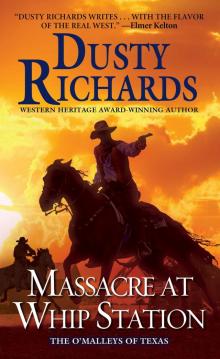 Massacre at Whip Station
Massacre at Whip Station Blue Roan Colt
Blue Roan Colt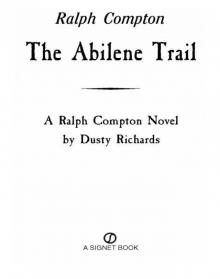 The Abilene Trail
The Abilene Trail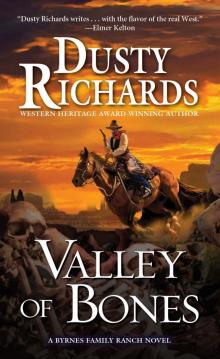 Valley of Bones
Valley of Bones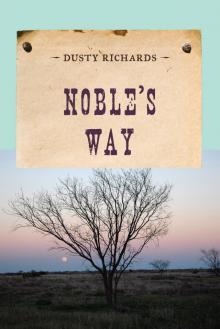 Noble's Way
Noble's Way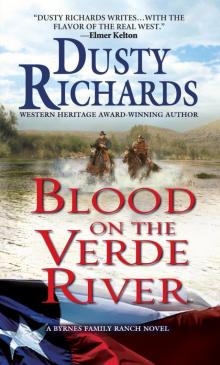 Blood on the Verde River
Blood on the Verde River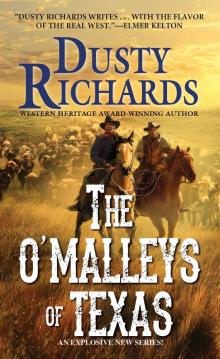 The O'Malleys of Texas
The O'Malleys of Texas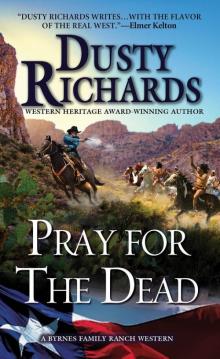 Pray for the Dead
Pray for the Dead Arizona Territory
Arizona Territory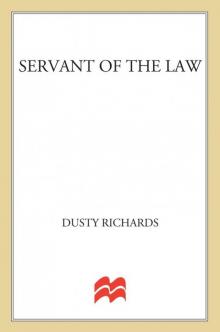 Servant of the Law
Servant of the Law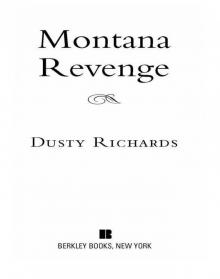 Montana Revenge
Montana Revenge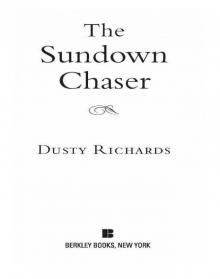 The Sundown Chaser
The Sundown Chaser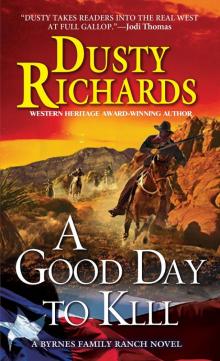 A Good Day To Kill
A Good Day To Kill Deuces Wild
Deuces Wild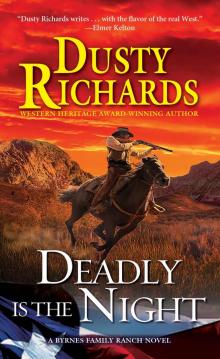 Deadly Is the Night
Deadly Is the Night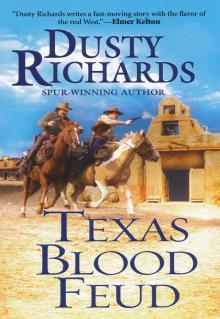 Texas Blood Feud
Texas Blood Feud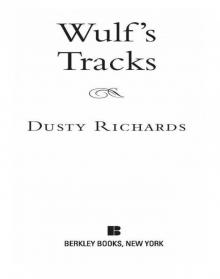 Wulf's Tracks
Wulf's Tracks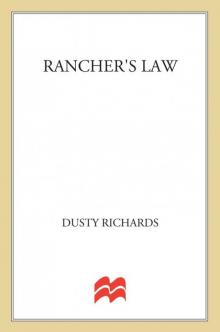 Rancher's Law
Rancher's Law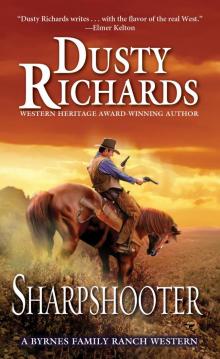 Sharpshooter
Sharpshooter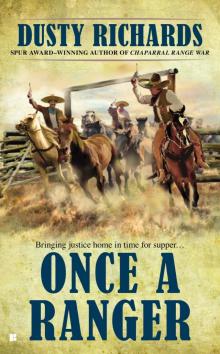 Once a Ranger
Once a Ranger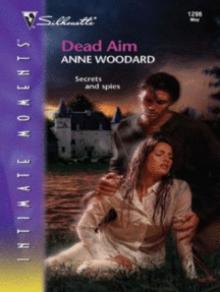 Dead Aim
Dead Aim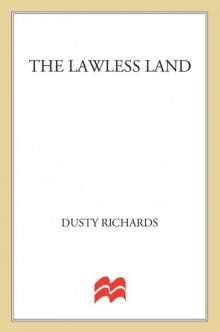 Lawless Land
Lawless Land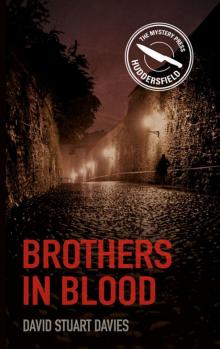 Brothers in Blood
Brothers in Blood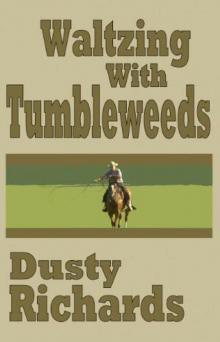 Waltzing With Tumbleweeds
Waltzing With Tumbleweeds